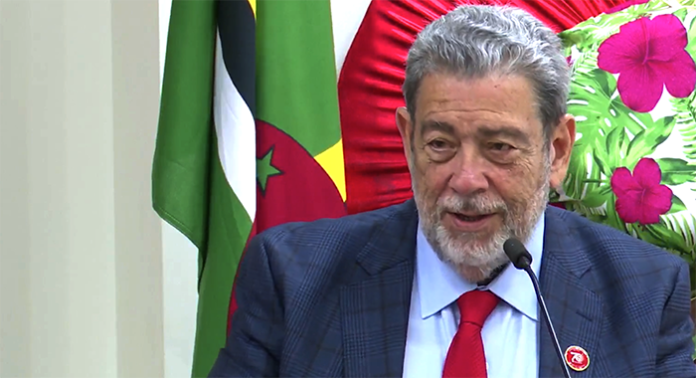
ROSEAU, Dominica (CMC) — St Vincent and the Grenadines Prime Minister Ralph Gonsalves has praised Dominica’s economic recovery after the island encountered numerous challenges over the years.
Delivering a lecture on Thursday night to commemorate the 25th anniversary of the death of former prime minister, Roosevelt Douglas, Gonsalves, the longest-serving head of government in CARICOM, said that the island’s economic recovery should not be taken lightly.
He said that as a result of the challenges faced by the island over the years, many of its economic leaders “had collapsed”.
“Bananas collapsed, Hurricane David, Hurricane Allen, Hurricane Maria, the global economic crisis … COVID and the occasional droughts, all the vagaries of climate change, the harshness of the external world, and through it all, we have survived and thrived.
“We have much to be thankful for,” Gonsalves said, praising the work of the current prime minister, Roosevelt Skerrit, even as he urged Dominicans “not to get carried away by vanity.
“To be sure, we all have complaints,” he said, noting many in the Labour parties across the region “want to bring the temple down … but if they remember the story with Sampson properly, Sampson got the temple down on everybody, including his own.
“And when you divide yourself and create confusion … and bring the temple down on everybody’s own, including your own, the morning after, you will say, ‘Oh God, what do I do?’ Weeping and gnashing of teeth,” he said.
He urged Dominicans to look at the 2025 Human Index Report of the United Nations Development Programme (UNDP), which placed Dominica in the highest of its four categories, “very high human development”.
Gonsalves said Douglas, who served as prime minister from February 2000 until he died in office eight months later, had, despite his “good basic colonial education”, rebelled about the limitations of that colonial education.
“He loved people, not in the general, but in the particular,” Gonsalves said, adding that “anybody could say they love people.
“The critical thing is to love in the particular because that love in the particular which has joys and pain … and in his case, he loved people in a particular manner,” Gonsalves said, noting that his electoral defeat in 1990, when they “jerrymandered” the constituency, he nevertheless would have learnt lessons from that.
“All politics is local, and you have to pay attention to what is happening on the ground, and he learned also the pain of defeat. Unless you have victory and defeat, you don’t know what this thing is about”.
Douglas is also remembered for his role in the 1969 Sir George Williams University situation, when black students began to protest racism at the Canadian institution.
He, along with future Canadian legislator Anne Cools and others, led an anti-racism sit-in at St. George Williams University, Montreal, which resulted in the peaceful occupation of the computer centre as negotiations took place between the administration and the student leadership.
However, once an agreement was reached, the riot police infiltrated the occupation, resulting in mayhem and destruction of the computer centre.
Douglas was identified as the ringleader and charged with obstructing the use of public property.
He served 18 months in prison before being declared a national security risk by then Solicitor General Warren Almond, setting the stage for his deportation in handcuffs and leg irons, vowing that he would only return as “Prime Minister of my own country”.
Gonsalves said he has joined with the ruling Dominica Labour Party (DLP), calling on Canada to exonerate Douglas, noting that he had served a jail term “not for what they charged him.
“He and I spoke about this a long time, and in fact, there were reports which showed, and he told me about the agent provocateurs, who helped to mash up the computers … and when Rosie was in jail, he did not waste time in jail.
“He taught prisoners — educated them. He wrote a report on prison conditions and recommended reforms in the Canadian prison system,” Gonsalves said, adding that when he was released from prison, Douglas sought to unite the people of the Caribbean, Africa, and other countries.
“The authorities said that he was a security risk, and they sent him back in chains. And even in the most humiliating thing Rosie would find humour…” Gonsalves added.


Alas, Gonsalves you mean you doh see how Skerrit bring down de temple on Dominicans? Including himself?
After de man do his damage to himself you want us to pardon him for us being last in CARICOM?
some people to dam wicked boss
For de sake of Rosie Douglas memory do not dare compare Skerrit.
U not in de kitchen and u come talk crap